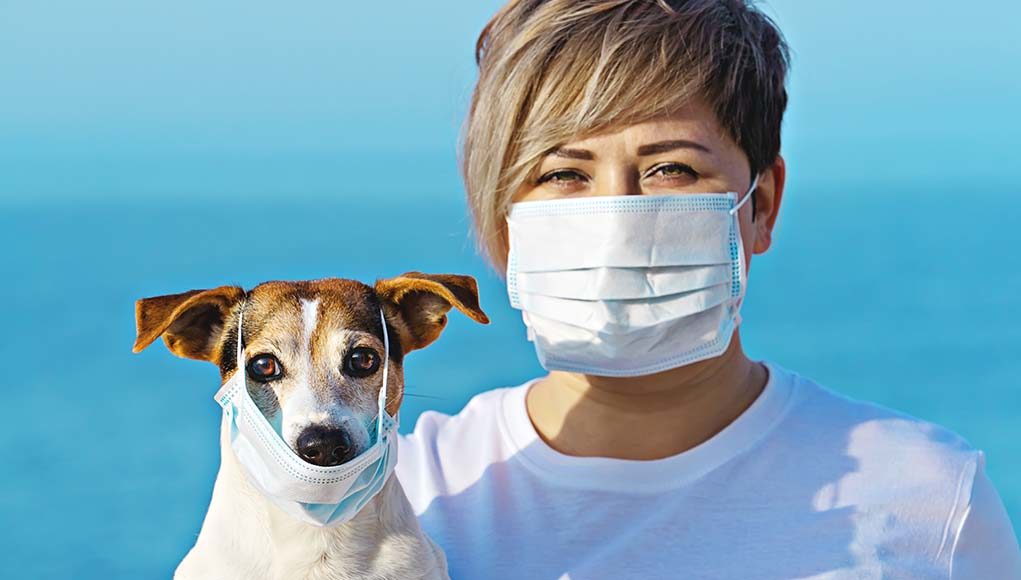Coronavirus, or Covid-19, is spreading across the world rapidly, causing lockdowns in most countries and forcing governments to take preventive measures meant to “flatten the curve” and keep hospital capacities from being overwhelmed (1, 2).
Table of Contents
Many concerned pet owners are now wondering how coronavirus affects dogs and also how this virus can subsequently affect pet owners through their dogs. Sadly, there is a lot of misinformation out there, so we highly stress that all dog owners scrutinize what they read or watch and only accept facts from reputable sources.
We have gathered plenty of reliable information about coronavirus and dogs that have been released, so here are some facts about coronavirus all pet owners must know.
Before we deal with Covid-19, which is a type of coronavirus that affects only humans, it is important to point out that pets (dogs and cats) can also contract certain types of coronavirus (3, 4).
For example, dogs can get Canine Coronavirus Type I (CCoV) or Type II, otherwise known as Canine Respiratory Coronavirus (CRCoV). The latter is a group 2 coronavirus, which is closely related to the bovine coronavirus that infects cattle and the human coronavirus that causes symptoms of flu and common cold in people (5, 6).
But speaking generally, the situation with pets and Covid-19 is a bit different.
Although experts are saying that it is highly unlikely that dogs and cats are in danger of getting Covid-19, which was also the official stance of the World Health Organization (WHO) posted on their myth-busting page, recent findings had some people worried.
In 2020, two dogs in Hong Kong tested positive for Covid-19 (7), and one of them later died (8).
However, neither of these dogs has shown any clinical signs of the disease, and both of them have been in households with infected humans. Due to the fact that no symptoms of the disease occurred in dogs, it is also possible that the virus was only present in these dogs without leading to infection.
Despite these two cases of infected dogs, the probability that your dog will get Covid-19 is extremely low (9). In fact, one of the leading veterinary diagnostics companies, IDEXX Laboratories, tried and couldn’t find a single case of Covid-19 among thousands of pets.
As the coronavirus is still in its infancy, new findings are likely to show up soon, but so far, all the data that scientists have collected to date suggests that your pet is fairly safe from Covid-19 (10).
While, so far, this seems to be extremely rare, new evidence shows that coronavirus (COVID-19, and not Canine Coronavirus) is a zoonotic virus type, which means it can be transmitted from humans to animals and vice versa.
This new evidence contradicts previous studies, which suggested that pets could never transmit coronavirus directly to humans (11, 12). There has also been a recent case of a tiger in the Bronx Zoo which contracted Covid-19 from humans.
However, recent studies claim that Covid-19 is known to live up to 3 days on some surfaces like metal, plastic, and glass (13). Therefore, in theory, you may contract coronavirus if you pet a dog that was in contact with an infected person.
That being said, it is less likely to contract the virus this way than by using a doorknob or coming in contact with some other smooth surface. According to the AVMA’s Chief Veterinary Officer Gail Golab, pet fur and other porous materials will trap and absorb pathogens, which makes it harder for us to contract them through touch.
Still, that very tiny possibility does exist, and if you have small children or seniors living in your household, you should probably keep them away from your pet for a while to avoid them petting your pet and putting their fingers in the mouth afterward.
Basically, stick to the most basic hygiene rules as recommended by all: wash your hands if you pet your dog, just like you should in any other situation.
3. Face Masks Don’t Help Dogs
Amid the coronavirus pandemic, people started buying face masks not only for themselves but also for their pets. While face masks are an important part of preventing the spread of Covid-19 in humans, health officials are quick to point out that putting them on dogs is not advisable.
First of all, they aren't going to do anything in terms of Covid-19 for dogs or their owners. Second, dogs don’t really need face masks for this or other conditions. Third, they might restrict your pet’s breathing and cause other health problems.
If you have tested positive for coronavirus, restrict contact with your pets just like you would with other people. Even though they are not in danger, they can potentially become carriers of the virus (without showing symptoms) and possibly become a source of infection for other people, even if we still haven't seen any proven cases of that.
As always, whenever you have to interact with your pet, wash your hands before and after you touch them.
4. There Is No Vaccine for Pets
Just like currently there is no vaccine or cure from Covid-19 for humans, there is still no vaccine for pets either (14, 15).
As mentioned before, dogs can still get Canine Respiratory Coronavirus, a different type of coronavirus. In the case of this, the vaccine does exist and many dogs often get vaccinated for this.
In Conclusion
Currently, experts agree that dogs and cats are not at risk of contracting Covid-19, even though there have been a few rare cases where traces of the virus have found in dogs without any clinical symptoms.
To keep your pets and yourself safe, practice the recommended prevention measures – washing your hands, disinfecting frequently touched surfaces and objects and staying away from your pets as much as possible if you have the virus.
READ NEXT: 22 Signs and Symptoms That Require an Immediate Vet Visit













